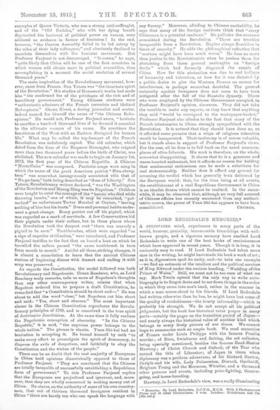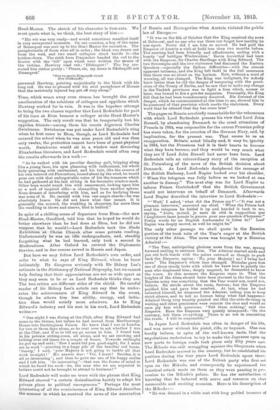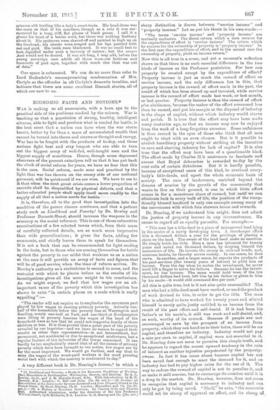LORD REDESDALE'S MEMORIES.*
A CULTIVILTED mind, experiences in many parts of the world, humour, geniality, innumerable friendships with well- known people, and a vigorous memory have enabled Lord Redesdale to write one of the best books of reminiscences which have appeared in recent years, Though it is long, it is eminently easy to read. If Lord Redesdale had taken more care in the writing, he might have made his book a work of art ; as it is, digressions spoil its unity, and—to take one example —we find an estimate of the intellect and the political services of King Edward under the curious heading, "Wedding of the Prince of Wales." Still, we must not be too sure of what we say. Mark Twain opined that the only way to write auto- biography is to forget dates and to set down things in the order in which they come into one's head, rather in the manner in. which a man muses aloud to his friends. If Lord Redesdale had written otherwise than he Lae, he might have lost some of the quality of readableness—the hearty informality—which is probably his strength. We do not accept all his political judgments, but the book has historical value proper in many parts—notably the pages on the transition period of Japanne and nearly always the historical value of another kind which belongs to every lively picture of our times. We cannot hope to summarize such an ample book. We read memories of France under Louis Philippe with the famous Praelin murder ; of Eton, Swinburne and Salting, the art collector, being specially mentioned, besides the famous Head-Master Hawtrey ; of Christ Church and Oxford; of the Tsar who earned the title of Liberator; of Japan in times when diplomacy was a perilous adventure; of Sir Richard Burton, Carlyle and his wife, Lady Palmerston, Disraeli, Garibaldi, Brigham Young and the Mormons, Whistler, and a thousand other persons and events, including prize-fighting, theatre- going, and horse-breeding.
Hawtrey, in Lord Redesdale's view, was a really illuminating
• Memories. By Lord Eflesdnio, 1C,C.11. With 51rhotogravu're Mateo nod 16 other Illustrations. 2 vole. London: Ilutoltinsou 'mad Oh [S20. net.]
Read-Master. The sketch of his character is first-rate. We must quote what is, we think, the best story of him :— " His wit was very ready—and would sometimes manifest itself in very unexpected moments. On one occasion, a boy of the name of Bosanquet was sont up to the Head Master for execution. The paraphernalia of doom were all in order; the block was drawn out from the wall, and two small collegers stood beside it—the holders-down. The sixth form Prrepositor handed the rod to the
Doctor with the upon which were written the names of the victims. Hawtrey read out:Saila-qua I ' The boy cor- rected him rather pertly: 'Please, sir, my name is BEliar:Nat not
Besanquet.'
'Sive to maxis BOaanqutft vocari Sive ]38altuqutit,'
answered Hawtrey, pointing majestically to the block with his long rod. Ile was so pleased with his neat paraphrase of Horace that the metrically injured boy got off very cheap."
Time, which wears away even stones, has brought the great amelioration of the relations of collegers and oppidans which Hawtrey worked for in vain. It was in the hopeless attempt to bring the two classes together that Lord Redesdale for part of his time at Eton became a colleger at the Head-Master's
suggestion. The only result was that he temporarily lost his oppidan friends—among them his cousin Algernon Charles Swinburne. Swinburne was put under Lord Redesdale's wing when he first came to Eton, though, as Lord Redesdale bad entered the school when he was nine years old and was then only twelve, the protection cannot have been of great physical worth. Swinburne would sit in a window seat devouring Elizabethan literature, and Lord Redesdale would often reap the results afterwards in a walk :—
" As he walked with his peculiar dancing gait, tripping along like a young faun, his oyes gleaming with enthusiasm, his whole body quivering with excitement, and his hair, like the zazzera of his own beloved old Florentines, tossed about by the wind, he would pour out with that unforgettable voice of his the treasures which he had gathered at his last sitting in his favourite window-nook. Other boys would watch him with amazement, looking upon him as a sort of inspired elfin—a changeling from another sphere. None dreamt of interfering with him, and as for bullying there was none of it. He carried with him one magic charm—he was absolutely brave. He did not know what fear meant. It is generally the coward, the weakling in character, far more than the weakling in thews and sinews, that is bullied."
In spite of a chilling scene of departure from Eton—the new
Head-Master, Goodford, told him that he hoped be would do better elsewhere than he had done at Eton, but he did not suppose that he would I—Lord Redesdale took the Blade Exhibition at Christ Church after some private reading. Unfortunately be was an idle undergraduate, and, steadily forgetting what he had learned, only took a second in Moderations. After Oxford he entered the Diplomatic Service, and in due course served in Russia and Japan.
But here we may follow Lord Redesdale's own order, and refer to what he says of King Edward, whom he knew intimately. He disagrees seriously with Sir Sidney Lee's estimate in the Dictionary of National Biography, but we cannot help feeling that their appreciations are not so wide apart as they may seem to be or as Lord Redesdale thinks they are. The two critics see different sides of the shield. No careful reader of Sir Sidney Leo's article can say that he under- rates the achievements of King Edward in the event, though he allows him less ability, energy, and initia- tive than would satisfy most admirers. As to King Edward's industry and his zest in his work, Lord Redesdale writes
" One night I was dining at the Club, after King Edward had come to the throne, but before he had moved from Marlborough House into Buckingham Palace. He knew that I was in London for two or three days alone, so he sent over to ask whether I was at the Club, and if so to bid me go across to him. I found him in his private sitting-room, all alone, and we sat smoking and talking over old times for a couple of hours. Towards midnight be got up and said; 'Now 1 must bid you good-night, for I must set to work '—pointing to a huge pile of the familiar red boxes. Surely,' 1 said, 'your Majesty is not going to tackle all that work to-night ! ' His answer was : ' Yes, I must! Besides, it is all so interesting '; and then be gave me one of his happy smiles and I left him. 'So interesting '—that was the frame of mind in which he faced his work—lie, the man who wo are expected to believe could not be brought to attend to business I " Lord Redesdale will make no truce with the phrase that King Edward showed "a certain disinclination hastily to adapt his private plans to political emergencies." Perhaps the most interesting of all the reminiscences of King Edward describes the manner in which he received the news of the annexation
of Bosnia and Herzegovina when Austria violated the public law of Europe:—
" It was on the 8th of October that the King received the news at Balmoral, and no one who was there can forget how terribly he was upset. Never did I see him so moved. He had paid the Emperor of Austria a visit at _kohl less than two months before. The meeting had been friendly and affectionate, ending with a hearty auf baldigeo Wiedersehen.' Baron Aerenthal had been with the Emperor, Sir Charles Hardinge with King Edward. The two Sovereigns and the two statesmen bad discussed the Eastern Question—especially the Balkan difficulties—with the utmost apparent intimacy, and the King loft lochl in the full assurance that there was no cloud on the horizon. Now, without a word of warning, all was changed. The King was indignant, for nobody know better than ho did the danger of tampering with the provi- sions of the Treaty of Berlin, and he saw that to make any change in the Turkish provinces was to light a fuse which, sooner or later, was bound to fire a powder magazine. Personally, the King felt that lie had been treacherously deceived. His forecast of the danger, which he communicated at the time to me, showed him to be possessed of that prevision which marks the statesman. Every word that he uttered that day has come true."
The pages on Russia are chiefly remarkable for the vehemence with which Lord Redesdale presses his view that Lord John Russell, by abandoning Denmark to the cruel attentions of Prussia in 1864, was responsible for the course Prussian policy has since taken, for the creation of the German Navy, and, by implication, for the present war. That seems to us an exaggeration. Britain acted blindly and, it may be, ignobly in 1861, but the Prussians had it in their hearts to become what they have become, and they would be very much what they are if Lord John Russell bad never been born. Lord
Redesdale tells an extraordinary story of the reception at St. Petersburg of the news of the British decision about Denmark. As Lord Redesdale deciphered the message at the British Embassy, Lord Napier looked over his shoulder, " When the telegram was fully before us we looked at one another in dismay." The next step was for Lord Napier to inform Prince Gortchakoff that the British Government would not intervene on behalf of Denmark. Afterwards Lord Napier described the interview to Lord Redesdale :—
" 'Well,' I asked, ' what did the Prince say P It was not a pleasant interview,' answered my chief. When the Prince had read the telegram he folded it up and handed it back to me, saying, "Aloes, milord, je mete de oho in supposition que l'Angleterre fasse jamais la, guerre pour tine question d'honneur." Pretty words for an English Ambassador to listen to!' Lord Napier was deeply moved, as well he might be."
The only other passage we shall quote in the Russian portion of the book tells of the Tsar's anger at the British victory at the Alma. The news was brought by a Russian Admiral :- " The Tsar, anticipating glorious news from the war, sprang forward smiling to embrace him. The Admiral started aside and put out both hands with the palms outward as though to push back the Emperor, saying: ' No, your Majesty I no! f bring bad news.' The Emperor's whole face changed. Nicholas gave him one of those steady looks with which he knew how to petrify the man who displeased him ; deeply angered, he demanded to know the worst. At this moment the Empress came in. That the heights of the Alma should have been stormed in the face of the Russian army was something that the Tsar would not, could not, believe. He strode about the room, furious; but the Empress pacified him and gave him comfort. At last, when he had collected himself, he dismissed the Admiral, telling him to keep strict silence, and to tell no human being what had happeneti. Admiral Greig very humbly pointed out that the aide-de-camp in waiting and other gentlemen were outside the door and would at once ply him with questions. 'Tell them nothing,' said the Emperor. Here the Empress very quietly interposed : 'On the contrary, tell them everything. There is no use in concealing the truth. 1 will be responsible.'" In Japan Lord Redesdale was often in danger of his life, and was never without his pistol, rifle, or bayonet. One can hardly believe, in spite of the well-known facts, that the negotiations undertaken to try to make the Japanese open up new ports to foreign trade took place only fifty years ago. The Mikado was still struggling against the Shogunate when Lord Redesdale arrived in the country, but he established his position during the four years Lord Redesdale spent there. Lord Redesdale was one of the British party who first set eyes on the Mikado, and consequently he experienced the fanatical attack made on them as they were passing in pro- cession to the Mikado's palace. He has the satisfaction of knowing that be behaved with nerve and resource on that memorable and exciting occasion. Here is his description of
the Mikado :—
"Ile was dressed in a white coat with long padded trousers of crimson silk trailing like a lady's court-train. His head-dress was the same as that of his courtiers, though as a rule it was sur- mounted by a long, stiff, flat plume of black gauze. I call it a plume for want of a better word, but there was nothing feathery about it. His eyebrows were shaved off and painted in high up on the forehead; his cheeks were rouged and his lips painted with red and gold. His teeth were blackened. It was no small feat to look dignified under such a travesty of nature; but the sangre Asul would not be denied. It was not long, I may add, before the young sovereign cast adrift all these worn-out fashions and trammels of past ages, together with much else that was out of date."
Our space is exhausted. We can do no more than refer to Lord Redesdala's uncompromising condemnation of Mrs. Carlyle as the offender in all Carlyle's domestic troubles, and indicate that there are some excellent Disraeli stories, all of which are new to ns.








































 Previous page
Previous page